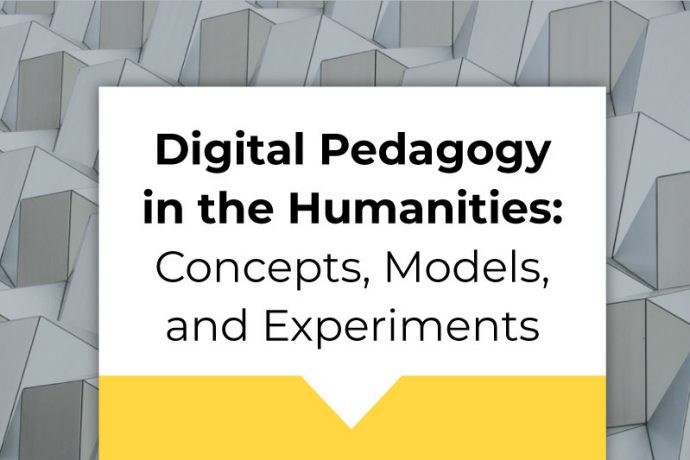Digital Pedagogy in the Humanities is published on a Commons site, open for all to read and share. This post will detail how you can create collections on the Digital Pedagogy in the Humanities site as a tool for teaching and learning.
Digital Pedagogy in the Humanities is a “peer reviewed, curated collection of reusable and remixable resources for teaching and research” edited by Rebecca Frost Davis, Matthew Gold, Katherine Harris, and Jentery Sayers and published open access by the MLA. Digital Pedagogy in the Humanities uses a keyword approach. Curators of each keyword gathered artifacts to exemplify the concept; in total, the publication includes over 500 artifacts of digital pedagogy that can be used in a wide range of domains and by many audiences. To learn more about this project, check out an overview in the introduction by Davis, Gold, and Harris.
Digital Pedagogy in the Humanities presents a range of voices in the work of the keyword curators and the creators of the pedagogical artifacts, and also allows the broader community of readers to create their own collections of the artifacts. You can browse by keyword and curator, explore tags and artifact types, or search for particular topics. As you find artifacts you want to revisit, you can create collections based on your own needs. The artifacts include a wide range of material, resources, and topics. The project has a broad potential audience, from students to researchers to curious readers looking to learn more.
The artifacts in Digital Pedagogy in the Humanities are meant to be reused and remixed. The collections feature allows you to make connections among the artifacts and across disciplines. It is a straightforward and flexible system that is also shareable.
So how can you use this tool in your everyday practices? Below are two user stories to give you some ideas. Note that these are stories created to provide insight, and are not meant to generalize or define the entire community of users.
User #1: Jennifer, Student, 22
Jennifer is a graduate student at Modern Language Association University studying anthropology. Her studies require her to research various digital methodologies, so she uses the collections feature to gather resources for the part of her paper that will focus on pedagogy. Because her focus is on linguistic anthropology, she starts by looking at the keywords “Language Learning” and “Classroom.” She creates a collection and places the material she finds under each keyword in it, so that it is easy to refer to when she writes her final paper. Jennifer is able to write an excellent paper using all of the information she was able to gather from the Digital Pedagogy in the Humanities site.
User #2: Thomas, Professor, 50
Thomas is a professor of African American Studies at Modern Language Association University, and COVID has moved his summer classes online. To get some inspiration and resources to help him plan for this course, he turns to the Digital Pedagogy in the Humanities site. He browses the keywords “Race”, “Diaspora”, and “Intersectionality” and creates a collection to place the resources he wants to revisit. He is able to find relevant and helpful assignments, projects, and curricula to inspire the creation of his own assignments for his asynchronous online course, and at the end of the term, he receives positive feedback from his students. He is also able to share his collection with other professors in his department, and they are able to gain inspiration for their courses as well.
Now that you have an idea about who can benefit from using the Digital Pedagogy in the Humanities site, watch the video below to see how to create your own collections!
Be sure to check out Digital Pedagogy in the Humanities for your teaching and research needs. You can also learn more info about the project in the “Guide to Online Teaching in the Humanities” blog post by Lee Skallerup Bessette on the Bringing Your Course Online site on MLA Commons. We think that this project and the collection-building tool can help to build our community, to share resources and support conversations within and across disciplines.
